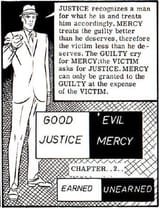>>17872767 (OP)
This only works if you think that justice is merely obedience to a set of laws rather than a more abstract concept. Remember that the purpose of the law is both to educate and to create accepted ways of solving disputes, it's only concerned with keeping the peace. Every law in some way has to do with a correct method of settling a problem. Injustice creates grievances, and grievances when unresolved lead to violence and disobedience. So what is the point of mercy? Mercy might be a suspension of the standard sanction for a crime or moral failure for a reason tied to the person's own circumstances. As a legislator the laws are inflexible, this is something even the Greeks came to understand and knew that in some way it would lead to injustice. Thus it was up to a judge to determine the circumstances that were unwritten but in line with justice that could be used to determine how best to address a case.
I'll give you an example. Jesus heals a man on the Sabbath. If you simply follow the Torah you know that one cannot work on the Sabbath. But what is work? This is a matter of debate and is not enumerated in the text itself, so then you as a judge must ask yourself, this Jesus has been brought before you in a case pertaining to a transgression. Do you consider healing on the Sabbath to be work? Is saving a life something that one must do even if it is considered "work"? How about merely restoring a man's withered hand? If the latter is not, then is he not guilty of doing so? And if he is, shouldn't he be punished? And yet you as a judge would know that he had done a good thing, so you could simply perform an act of mercy and let him go. Because at the end of the day mercy is not about cases in which a man is fully aware of what he is doing and has no reason for doing so, but rather for cases in which a man is doing good but is caught by inflexible laws or he is so overburdened by a poor constitution or mental state that he is inclined to disobedience.

